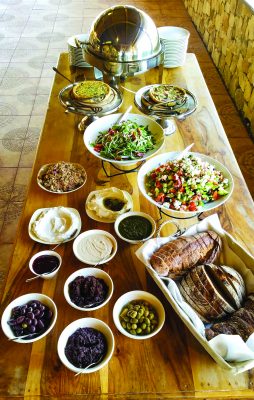×


We have detected your country as:
Please click here to go to the USA website or select another country from the dropdown list.
by: Jo Sarah Stanford, BFP Staff Writer
Israel is like no other place on earth. The history of the Jewish people stretches back thousands of years, yet the modern nation is only 71 years old. Almost 30% of Israelis are olim (immigrants), coming from all across the world and bringing some of their own culture with them. Israel is thus a wonderful mix of ancient and modern, with customs, cultures and traditions as diverse as the people. There are, however, a few customs unique to the Land.
 Breakfast Fit for a King
Breakfast Fit for a KingThe first surprise you might encounter on a visit is breakfast. The Israeli breakfast buffet at hotels and restaurants does not disappoint. Aside from providing the standard Western fare of toast, cereal and coffee, you will find a vast array of different foods—and quite a few you wouldn’t expect at breakfast.
There is a wide variety of yogurts and cheese, from cheddar to feta and the thick, creamy labaneh (strained yogurt). You have a choice of fresh vegetables, such as tomato, cucumber and peppers (capsicum), which would not be the same without hummus (a paste of pureed chickpeas) for dipping. If that is too healthy for you at such an early hour, you can always swap the veggie sticks for some fresh bread or pita.
According to Jewish dietary laws (kashrut), meat and dairy cannot be eaten in the same meal, so you won’t see any meat at breakfast. However, you will find a variety of pickled fish, as this is considered parve (neither meat nor dairy). Add to the menu olives, tahina (a condiment made from ground sesame), halvah (a fudge-like candy made from sesame paste) and even fresh honeycomb, you won’t be left hungry. You will also have your choice of eggs—scrambled, boiled or fried, and, of course, no Israeli breakfast would be complete without the classic dish shakshouka: poached eggs in a tasty tomato sauce.
Friday morning and early afternoons in Jerusalem are a rush of people as the city prepares for Shabbat (Sabbath). In the shuk (market), a cacophony of voices vie for attention as shoppers purchase last-minute groceries for the weekend and men buy flowers for their wives from the corner pop-up store.
Then, just before sundown—the start of the Jewish day—a hush falls over the ancient city as people enter into the Sabbath rest. Everything stops. Shops close and buses stop running—only a few cars drive the nearly empty streets. As the sun sets, people come together and light the Shabbat candles, recite blessings and share a meal. On Saturday morning, families dressed in their finest walk to their local synagogue for prayers and the reading of the Torah (Gen.–Deut.). Strangers wish one another “Shabbat shalom” (“Peace on the Sabbath”) as they pass each other on the street.
It is a wonderful time of rest and reflection, a chance to recharge. About an hour after sunset on Saturday, the shops reopen, public transport resumes and the vibrant Jerusalem city life begins again—until next week.
 End of the Line
End of the LineLining up in an orderly queue is not done. At the bus stop, when the bus pulls up and opens its doors, everyone instantly squeezes on—past the people who are trying to squeeze out. However, when the bus is crowded, passengers, especially the school children, are always quick to give up their seat to the elderly or disabled. At the supermarket or bank, it is not unusual for someone to leave the line or have a seat nearby, only to come back to claim the spot. Somehow, everyone seems to know their place in the line. Again, the elderly are given priority, something which is actually written into Israeli law.
Under the tradition of Middle Eastern hospitality, strangers are treated like family in Israel. There is no such thing as a private conversation. If you’re on the bus and comment to a friend that you have a headache, the person behind you will helpfully ask if you have drunk enough water. Strangers will hand you their baby to hold while they go up front and scan their bus ticket. Or if a perfect stranger learns that you have nowhere to go for Shabbat, they will quickly invite you to share dinner with their family.
Perhaps be prepared for a few awkward questions on subjects that might be considered taboo in the West: When are you having children? How much do you earn at your job? Don’t be offended. Israelis aren’t being nosey or rude. They just want to get to know you. You are friends now, and a friend is as good as family.
Israelis are hardworking, passionate people. Honest and direct, they won’t waste time beating around the bush but will tell you plainly what they think. Conversations are often carried out in loud tones, but this is the norm. Strangers will have lively debates on the streets on any topic, including politics and religion. However, when it is over, they will shake hands and walk away as friends.
In Israel, the native-born are colloquially known as sabra, referring to the cactus fruit: prickly on the outside, but soft and sweet on the inside.
As you walk the streets of Jerusalem, you will see a myriad of different people: the ultra-Orthodox men in their smart suits walking with their children; the secular going to work at one of Israel’s many modern enterprises; the young soldiers and the school children catching the bus together. They are, indeed, a people from so many different backgrounds and traditions of their own, joined together to create customs and a culture that is distinctly Israeli.
Photo Credit: See photos for Photo Credits
All logos and trademarks in this site are property of their respective owner. All other materials are property of Bridges for Peace. Copyright © 2024.
Website Site Design by J-Town Internet Services Ltd. - Based in Jerusalem and Serving the World.